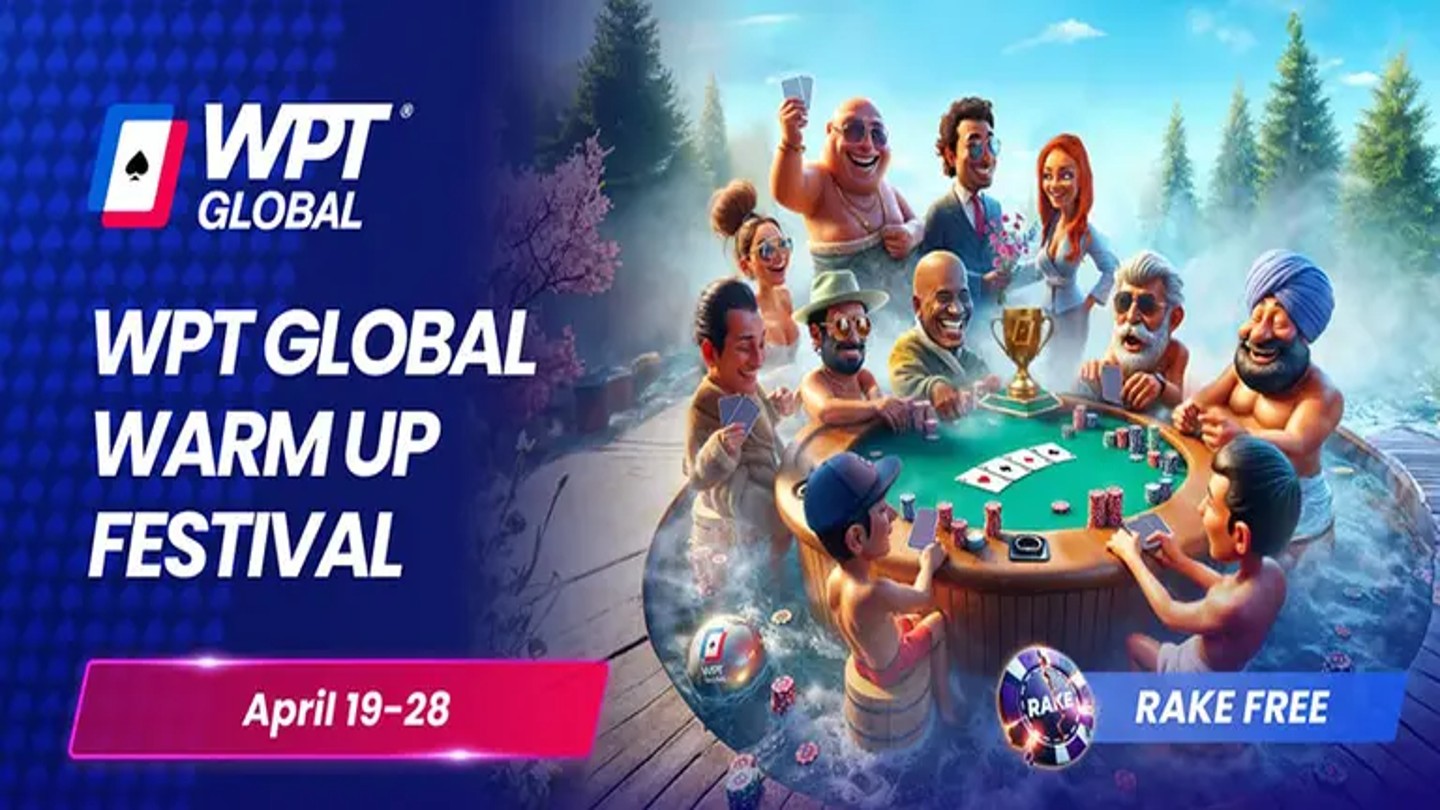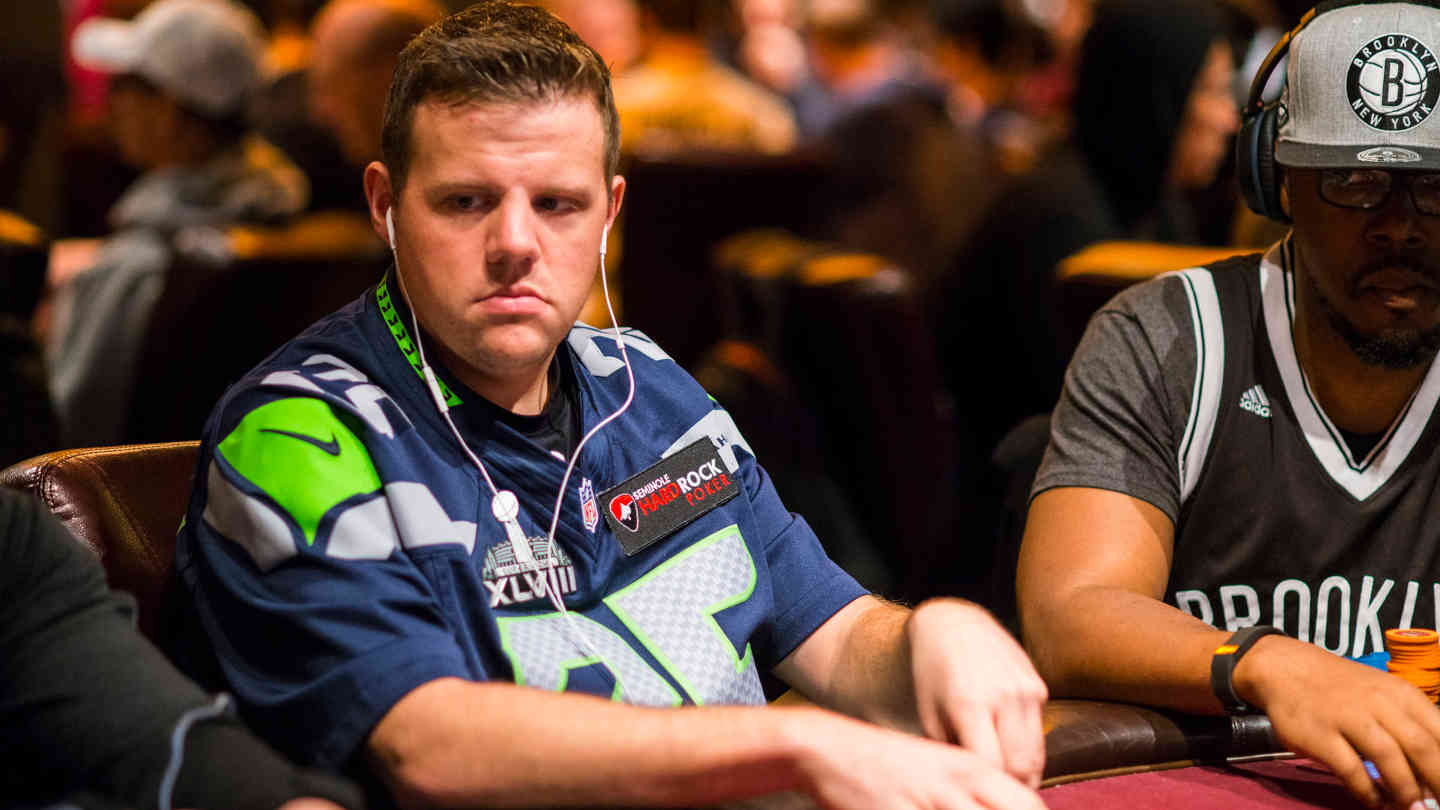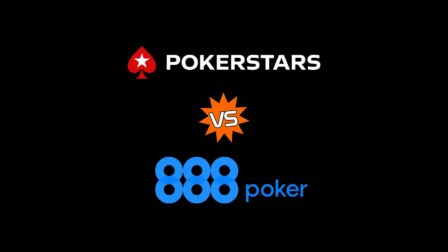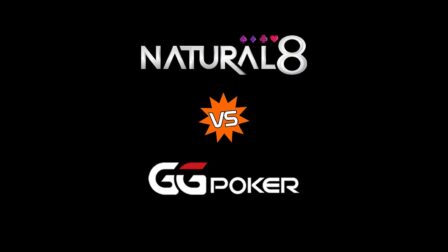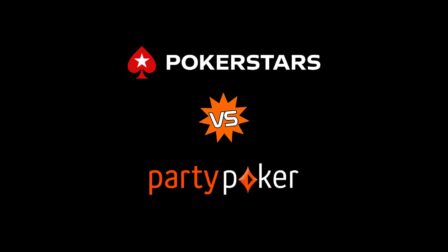PokerCoaching.com 14-Day Cash Game Challenge Review – Should You Go For It?

16 minutes
Last Updated: March 19, 2024
Mastering cash games is believed by many to be one of the most challenging things in poker. With so many moving parts and almost always playing deep stacked, developing a solid, winning strategy, especially against good players, is no easy task and this course might help you.
If you’re serious about becoming a winning player, the only way to go about it is by seriously applying yourself to studying the game.
There is no lack of content out there to help you with this goal, and the 14-Day Cash Game Challenge by Jonathan Little is just one of many resources on offer.
Featuring more than eight hours of useful video lessons broken down into several different learning areas, it brings a wealth of knowledge condensed inside lessons that are just the right length to present the important information while keeping your attention.
On top of that, if you are a member of premium membership of Jonathan Little pokercoaching.com training site, you will get this challenge for FREE. This is the breakdown of the lessons by days:
- Preflop Bet Sizing by Jonathan Little (19 min.)
- When Your Raise Gets 3-Bet by Little (12 min.)
- Facing A Preflop Raise by Little (19 min.)
- Playing from the Blind by Lexy Gavin (40 min.)
- The Flop by Little (32 min.)
- Live $5/$10 Cash Game Review and Analysis by Matt Affleck (80 min.)
- Crushing Tough Games by Little (49 min.)
- 200NL Live Play And Explain by Justin Saliba (70 min.)
- 200NL Review of Tough Hands by Saliba (52 min.)
- The Turn by Little (27 min.)
- Crushing Tough Cash Games Part 2 by Little (30 min.)
- The River by Little (20 min.)
- Full Hand Examples by Little (33 min.)
- 100bb Heads-Up by Saliba (29 min.)
- The Final Exam


When this Cash Game Challenge was originally released, lessons were published on a daily basis. Now they’re all available for viewing with no restrictions so you can organize your time however you want.
That said, after going through all the material, I’d suggest not trying to take in too much at any one time.
Although lessons aren’t long, you’ll be better off watching them with full focus and maybe taking some notes as you go to extract the full value from every video.
If you feel like watching some more content, you can always jump over to some play and explain videos as these are quite entertaining, and you can watch them several times.
Also, you’ll find a short poker quiz at the end of each section. These are not only fun but also very beneficial and will help you immediately know if you’ve maybe missed out on something important, so I suggest taking a couple of minutes to go through them.
And with that introduction out of the way, here’s a short overview of what you can expect to find inside the PokerCoaching.com Cash Game Challenge.
Day 1: Preflop Bet Sizing
Preflop play is a huge and very important topic that covers a number of different categories. For the first lesson of this cash game challenge, Jonathan Little starts with the one that many players struggle with the most – bet sizing.
The first short video covers some of the most important points with regards to preflop sizing.
Little discusses the process behind figuring out the correct number and the goals you want to achieve. It’s about finding the fine balance between protecting your strong hands but also allowing your opponents to make bad calls with weaker holdings.
He provides a couple of good examples to bring these points home and points out things you should be thinking about when determining your preflop raise size.
Little also touches upon exploitative ideas and how you can diverge from standard strategies when playing against bad players who have a tendency to call big raises before the flop.
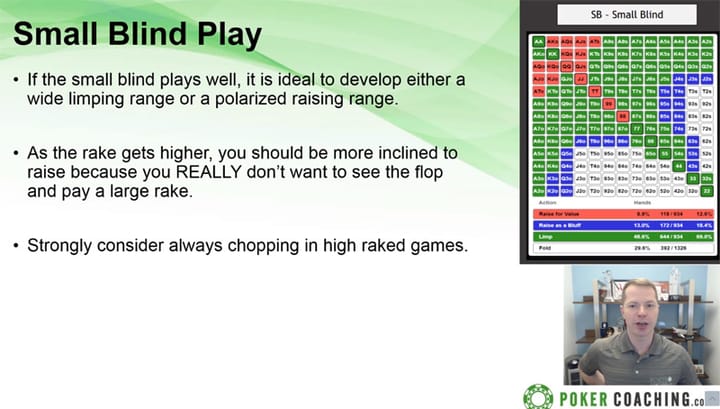
The second video on preflop bet sizing looks at some more concrete scenarios. First of all, Little discusses situations where it’s folded to you, and you have a chance to open. He doesn’t just talk about sizing but also general things to consider, such as playing healthy and fundamentally solid ranges and thinking about the tendencies of players left to act behind you.
You’ll get charts with default preflop ranges from different positions at the table, which is very useful in itself.
The video also specifically discussed play from the blinds, and Little touches upon some interesting points in terms of building a balanced limping and raising range from the small blind.

Day 2: When Your Raise Gets 3-Bet
Every time you raise, there is a possibility that one of the opponents left to act will 3-bet. Knowing how to react to these 3-bets is crucial to your success in poker, which is probably why Little decided to cover this lesson early in this 14-Day Cash Game Challenge.
The video explains the concept of the minimum defense frequency, i.e., the minimum percentage of your range you should be continuing with when facing a 3-bet.
Learning how to figure out this number and sticking to it will make sure your opponents aren’t exploiting you, and you aren’t over-folding in 3-bet pots.
Of course, you’ll be playing different parts of your range differently. Little explains what hands are good candidates for 4-bets, what hands play better as just calls, and, finally, what part of your range you need to give up on.
When coming up with these ranges, you also need to consider the opponent you’re up against and their general tendencies to make proper adjustments.
Day 3: Facing A Preflop Raise
In poker, you have to adjust to different situations. You aren’t always the one driving the action. Sometimes, quite often, you’ll be facing a preflop raise by someone in front of you and will have to decide how to proceed with your hand.
This is a very good video by Little that goes into quite some depth, explaining different scenarios where a preflop raise is involved.
You might have a playable hand you’re tempted to call with, but you mustn’t disregard other players still left to act.
Maybe the original raiser is likely to fold to a 3-bet, which should encourage you to 3-bet with the entire strong part of your range.
I like the fact that Jonathan Little provides clean and no-nonsense charts that give you a clear plan of action when facing a raise from different poker positions at the tables.
He also tries to keep things simple and understandable instead of going into complicated calculations. At the end of the day, playing fundamentally solid poker will get you quite far, and this cash game course by PokerCoaching.com isn’t trying to make things sound more complicated than they are.
Day 4: Playing From The Blinds
Playing from the blinds is one of the hardest parts of poker. You have to put the money in and play with a random hand.
While it’s impossible to be profitable from the blinds, your goal is to try and lose as little as possible.
Due to this topic being so important, it was no surprise to see that this was one of the longer videos in the PokerCoaching.com Cash Game Challenge.
It is a 40-minute lesson presented by Lexy Gavin covering all you need to know about playing from the blinds in cash game poker.
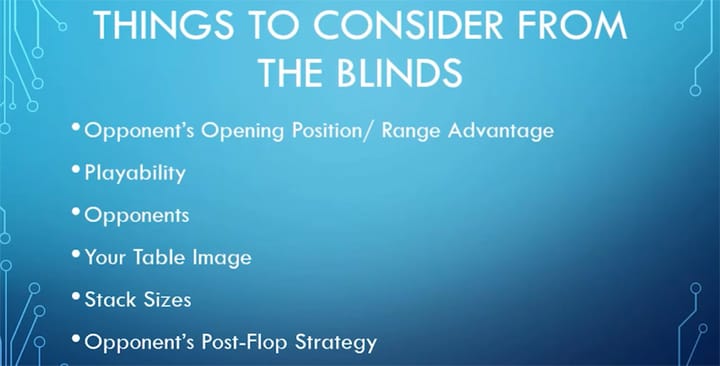
Lexy presents several crucial factors to consider when in the blinds, such as the position where the open is coming from, what’s your table image like, the playability of your hand, stack sizes, etc.
Then she goes into every single one of these factors and explains them in detail so that by the end of the video, you should have a much better idea of how to improve your play from the blinds.
I like the fact the video contains quite a few poker hands examples in addition to a general strategy discussion.
It’s much easier to take in and understand things when you see them in action instead of trying to visualize these scenarios in your hand without any actual examples to look at.
Day 5 of Pokercoaching.com Cash Game Challenge: The Flop
For day 5 of the 14-Day Cash Game Challenge, you’re presented with two videos addressing the flop play, which are presented by Jonathan Little.
In the first video, Little talks about some general things you should keep in mind when playing the flop.
What’s the goal you want to achieve with your bets and how to best accomplish it? Are you better off betting smaller on three streets or firing big on the flop?
Of course, this decision will depend on many factors, such as the board texture, your opponent tendencies, etc.
A lot of emphasis is put on exploiting other players and structuring your game plan in a way that is likely to produce the best results against a particular opponent – provided you have enough information on them.
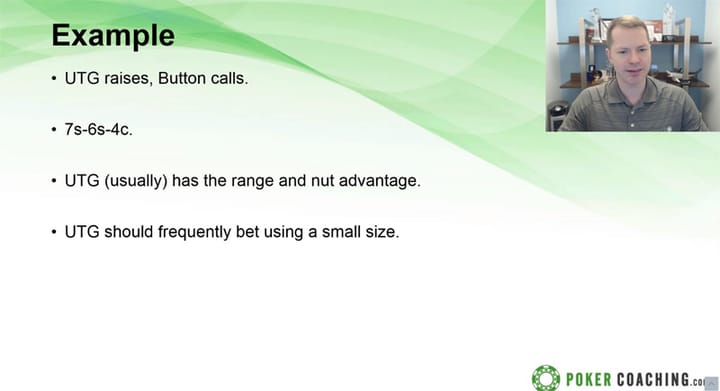
The lesson also talks about the concept of range advantage, which is one of the fundamental ideas you need to understand if you want to learn cash games.
It’s about understanding who’s more likely to be ahead on a particular flop texture given the preflop action and tailoring your play accordingly.
The second video contains several examples with different scenarios. These examples are meant to help you internalize all the information from the first video and better understand all the theoretical principles that were discussed in it.
Day 6: Live $5/$10 Cash Game Review
This is the longest video in Jonathan Little Cash Game Challenge, and it’s presented by Matt Affleck.
As you can guess from the name of the lesson, this one focuses on actual hands from live cash games played in Las Vegas.
Affleck uses a known poker software called PioSOLVER to check a variety of hands and discover any mistakes or leaks both in his own and his opponents’ play.
Solvers can give you excellent mathematical solutions to poker problems that you just can’t figure out on your own, so it is surely worth checking it out.
Matt is doing a good job of explaining his thought process in actual hands as well as highlighting important details from the PioSOLVER analysis, so there is a lot of valuable information.
Day 7: Crushing Tough Cash Games
On day 7 of the PokerCoaching.com Cash Game Challenge, Jonathan Little is back with a two-part lesson on beating tough cash games online.
To do these videos, he actually went over to PartyPoker and sat down in some $100 NL games, which are pretty tough for anyone who is just starting out.
The lesson starts with some general ideas to keep in mind, such as the fact that most players in these games play well, but good players make mistakes as well.
So, using a GTO poker strategy and fundamentally sound play is the key here.
Additionally, since many sites (including Party) no longer allow HUDs, it’s really important to pay attention to what’s going on, take notes on players, and be focused during your sessions. Auto-piloting won’t cut it in these cash games.
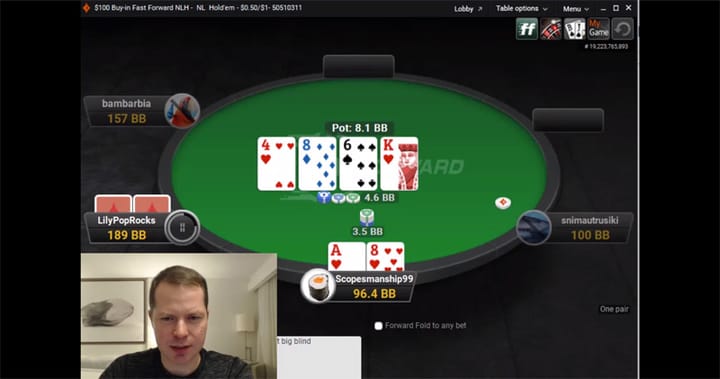
The second video is of Jonathan Little playing live on PP $100 Fast Forward tables and sharing his thoughts as he goes along.
I find this approach much more honest and useful than reviewing hands after the fact. You get to see how things are in real-time and what kind of challenges you can expect when you sit down to play without the advantages of solvers and post-game analysis.
He does refer to GTO charts as he goes along and demonstrates just how much time you have to use these in when playing.
These charts are quite useful and available on the site, and with this video, you can see just how valuable they are to help you make the right decisions in most spots.
Again, given that you’re likely up against competent players most of the time and with no HUD information to fall back on, resorting to GTO and fundamentally solid poker is probably the way to go.
Days 8: 200NL Live Play & Explain
Day 8 of PokerCoaching.com Cash Game Challenge continues in a similar tone.
In this lesson, you’ll see a live play at 200NL level at WSOP.com by Justin ‘Jsaliba2’ Saliba.
The live play video is over an hour-long, and it once again covers all sorts of spots as they happen in real-time.
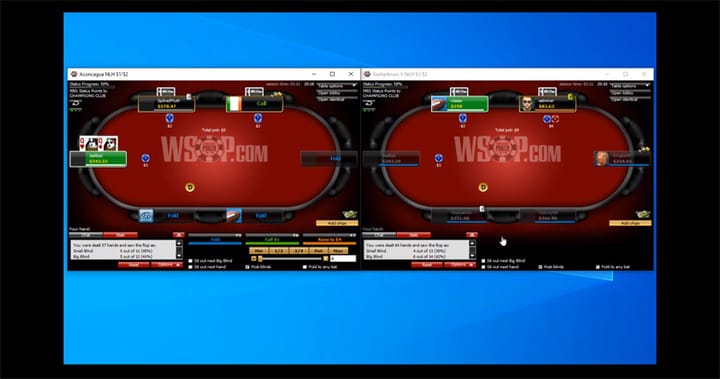
I do think these live hand reviews add a lot of value to the overall course. It’s one thing to talk strategy, but it’s a different thing entirely to see various spots you have to deal with in actual games.
It goes to show that no matter how experienced someone might be, they’ll often find themselves in situations where there is no simple or clear-cut answer.
Day 9: 200NL Review of Tough Hands
The next day’s lesson kind of shows what life looks like for professional cash game players.
It is the continuation of the previous lesson as ‘Jsaliba2’ sits down to analyze some of the difficult hands from the session played earlier.
Obviously, you don’t get enough time to do these things in-game, so once the play is over, it’s important to look at difficult spots with a fresh set of eyes.
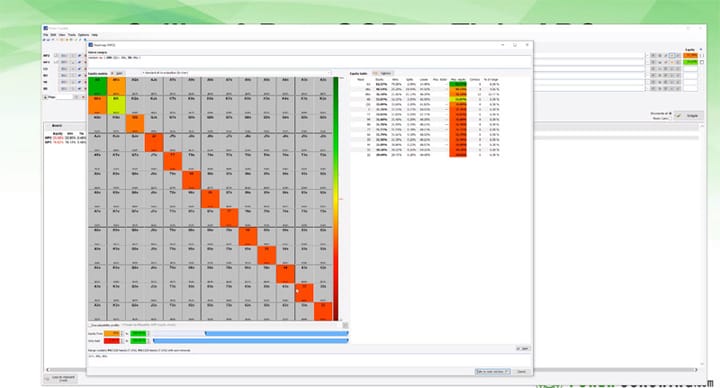
The video contains a mix of analysis done using PioSOLVER and Justin’s thoughts of what he could have done differently if he had more time to think about hands.
I think this video is really a great watch not only for the valuable information contained inside but also as a reference on how to approach the post-game analysis to improve your play and discover any leaks you might have.
Day 10 of Jonathan Little Cash Game Challenge: The Turn
For the Day 10 lesson, it’s back to more theory as Jonathan Little goes on to discuss the turn play.
By this point in the course, you’re probably accustomed to the lesson structure, so there are really no surprises there.
Little kicks things off by explaining some general considerations, such as defining and adjusting your opponent’s range based on their flop actions.
The first video in the two-part lesson also talks about multi-way turns, which can be quite tricky.
It’s important always to exercise caution in multi-way pots as the fact that players got to the turn usually indicates they have pretty strong ranges.
The second video brings a series of turn play examples, similar to the ones found in the flop play section.
These examples do refer to some of the concepts explained earlier in the course, such as range advantage, so you should definitely watch theoretical lessons in the order they’re presented to be able to keep up better.
Day 11: Crushing Tough Cash Games Part 2
On Day 11, Little comes back with more live play from $100 NL Fast Forward games on PartyPoker.
It’s another 30 minutes of footage of him playing in real-time and explaining his decisions as he goes along.
I must admit I found these very enjoyable as Little’s explanation entail a nice mix of hard strategy and common sense, so it doesn’t get boring at any point.
Day 12: The River
Nearing the end of the Jonathan Little 14-Day Cash Game Challenge is the lesson on river play also presented by Little.
This video is a culmination of sorts of everything that’s been discussed so far and serves to round things up nicely while also introducing several new thoughts and ideas.
How can you tailor your play on the river for maximum profitability?
Once again, Little spends a fair bit of time talking about players’ general tendencies and how you can exploit these to make more money.
Betting big or firing a small river bet can be just as effective, depending on who you have sitting across the table. So, paying attention and taking notes on players can be a huge help here.
Against competent players, you’ll obviously need to balance things more, but this doesn’t mean you can’t make money against these players as well.
If you listen to and implement the advice from this video, you’ll realize that there is always a way to structure your river play profitably as long as you have a decent idea of who you’re up against.
A lot of the discussion in this lesson revolves around building a polarized strategy, i.e., betting big with very strong made hands and bluffs. Little talks about the advantages and problems of this strategy but also explains how it’s quite difficult to have a perfect polarized strategy given the action on previous betting streets.
Day 13: Full Hand Examples
Wrapping things up for the course is the lesson covering a number of full hand examples, starting with preflop and going all the way to the river.
Little kicks things off with some general thoughts and a summary of important highlights from all the previous lessons before proceeding to actual hands.
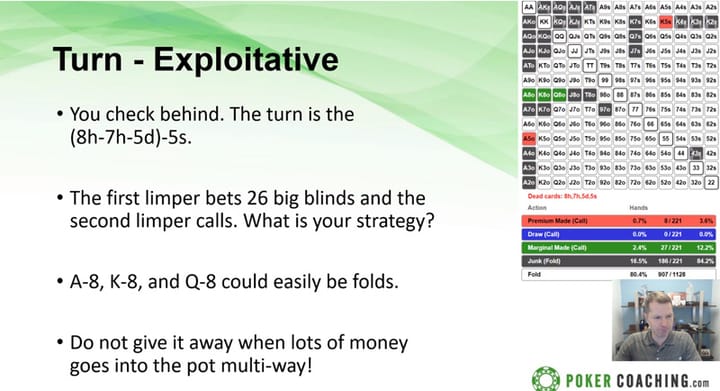
This lesson doesn’t introduce any new concepts. Instead, through different examples, you’re reminded of all the different things that have been discussed throughout the Pokercoaching.com Cash Game Challenge and asked to try and figure out the best way to play in certain spots.
Day 14: 100bb Heads-Up Play
The final video in this PokerCoaching.com challenge is provided by ‘Jsaliba2,’ and it can be considered a bonus video.
It covers heads-up play specifically, which isn’t a too common scenario in cash games, but this kind of knowledge can still come in handy from time to time.
This is especially true for online play where you might be the one starting tables or keeping them alive playing one on one and waiting for more players to join.
You’ll find a very solid and sound heads-up strategy in this 30-minute video. It may not make you the master of heads-up play, but Justin definitely provides some solid guidelines on how to approach this format and structure your play in a way to maximize your profitability.
Jonathan Little Cash Game Challenge – The Final Exam
Once you’re done with the course, you can check your newly found knowledge with the final exam.
This is a series of 30 questions that cover a variety of topics that have been covered throughout the challenge.
How well you do with this exam will tell you just how much you’ve managed to learn and if there are certain areas that you might need to revisit.
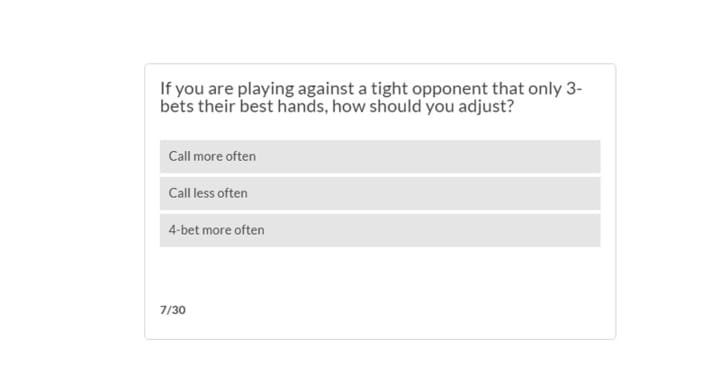
I really like the idea of wrapping things up with an exam of this kind. It’s too easy to go through a poker course and convince yourself you’ve learned stuff.
If you have to pass an exam, you’ll know immediately if you were able to acquire the new information.
If you don’t do well, you’ll at least know there are certain segments you might have misunderstood or slept through so you can go back to them and watch them again with more focus.
Summary: Who Is 14-Day Cash Game Challenge For?
The Cash Game Challenge is well organized as it follows a logical progression and doesn’t skip on any important areas. You start with preflop and slowly progress all the way to the river.
I do have to say, though, that this PokerCoaching.com challenge isn’t intended for complete beginners. This isn’t to say that you need to be an expert to make good use of this course, but if you have never played poker, this one is not for you.
But if you already know the main concepts and want to move up from the micro stakes, this is a great option for you.
The combination of theoretical lessons, play-and-explains, and post-game hand analysis makes this course an excellent resource for those looking to learn cash games and improve their bottom line.
The good news is that this course is FREE for Jonathan Little Premium subscribers, so if you want to check it out but haven’t enrolled yet, you can do it by clicking here.









